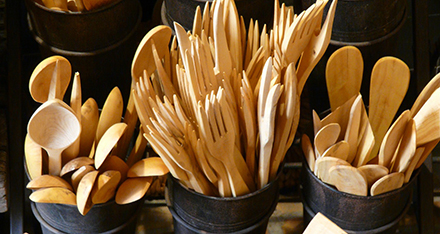The Victorian Government’s ban on single-use plastics such as plates and straws comes into force today following the banning of plastic bags in 2019. Source: Timberbiz
And the Victorian Forest Products Association believes the timber industry can play a big part in delivering environmentally friendly alternatives.
“In many cases, that alternative will be a wood fibre product – the quintessence of renewability,” VFPA CEO Deb Kerr said.
“This includes products such as cardboard packaging, recycled paper plates, bags, and wooden cutlery.”
This new ban in Victoria covers the sale and supply of single-use plastic drinking straws, cutlery, plates, drink stirrers, cotton bud sticks and expanded polystyrene food and drink containers.
In South Australia consultation on draft regulations begins today with people invited to provide input as to how they would like to see bans implemented as well as proposed exemptions.
From September next year, the ban is set to extend to a number of other items including plastic bags (produce barrier bags and thicker ‘boutique’ style bags), polystyrene and plastic food and beverage containers, single-use plastic cold cups and single-use plastic coffee cups.
“As a society, we can go further than single-use plastics and look towards replacing other plastics,” Ms Kerr said.
“Wood contains cellulose to make bioplastics. Victoria has 22% of Australia’s plantation estate, so we have the resources, technology, and manufacturing know-how available today to replace traditional plastics with the new generation of bioplastics.
“Examples include eyeglass frames, glass replacements, electronic displays and car interior applications and, more recently, even 3D-printed houses,” she said.
“There is no excuse. Every Victorian and every Victorian business can support a more sustainable future by reducing our waste footprint. Wood is biodegradable, compostable – and it is the ultimate renewable.”






